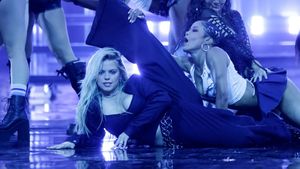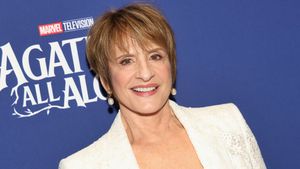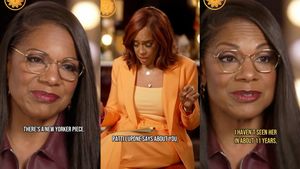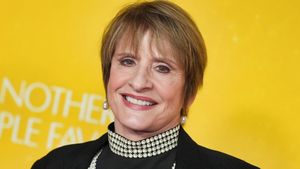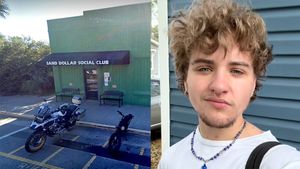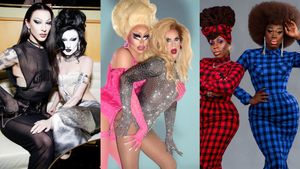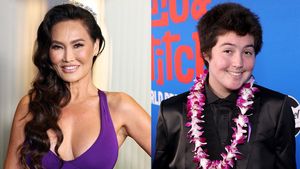Mitt Romney, who
earlier this year had to backpedal on statements about
his hunting exploits, is explaining himself again after
claiming an endorsement he did not receive and saying
he witnessed his father in civil rights marches he
could not have seen.
''It's a figure
of speech,'' Romney said Thursday after media inquiries
into the Republican presidential contender's statement
during his recent religion speech that he watched his
father, the late governor George Romney of Michigan,
march with Martin Luther King Jr.
Romney, who was
in high school at the time, later said he only heard of
his father marching, and some historians have questioned
whether his father in fact did march with King. The
Romney campaign provided books and news articles it
said supported his statement.
Romney said it
was akin to him stating, ''I saw my dad become president
of American Motors.'' He told reporters in Iowa, ''I wasn't
there when he became president.''
Romney similarly
backtracked after telling a national television audience
Sunday on NBC's Meet the Press, ''I received
the endorsement of the NRA'' in 2002 while running for
governor of Massachusetts.
The gun rights
group did not endorse either candidate, and it gave a
higher issues rating to his Democratic opponent.
Romney said
Monday, ''It was, if you will, a support phone bank, which
is not an official endorsement.''
The questions are
especially sensitive for Romney, who is trying to
rebound against rival Mike Huckabee in Iowa and maintain a
lead in New Hampshire, the leadoff contests in the
voting for presidential nominees.
Throughout his
campaign, he has been dogged by allegations of
flip-flopping on key issues, including abortion rights, gun
control, and gay rights.
''It's the
fine-tuning that's created the problem. It's always that one
extra step that causes him the trouble,'' said Tobe
Berkovitz, a longtime Romney observer and the interim
dean of Boston University's College of Communication.
''You can't just say that African-Americans were accepted
into the church and I was happy, you have to say you pulled
over and you cried.''
The latter was a
reference to another statement Romney made on Meet the
Press, in which he tried to convey his emotion
after learning in 1978 that his religion, the Mormon Church,
had given full privileges to blacks.
Romney recalled
his exact location when he heard the news -- the Fresh
Pond traffic rotary in Cambridge -- but he misspoke when he
said he thought he was in law school at the time. In
fact, he had graduated from Harvard Law School three
years earlier.
''If this had
been three months ago, it would have been more water off
the back of the duck, but right now, everything is magnified
not only for him but Rudy and Hillary and everybody
else,'' said Berkovitz, mentioning fellow presidential
contenders Rudy Giuliani and Hillary Rodham Clinton.
Democrat Al Gore
faced similar questions during the 2000 campaign, when
he falsely claimed to have accompanied a federal disaster
relief official on a tour of a fire zone, and on
previous occasions when he claimed more credit than
many felt he warranted about the creation of the Internet,
the Strategic Petroleum Reserve, and the Love Canal toxic
waste investigation.
Romney is well
aware of the power of words in politics. His father saw
his own presidential campaign founder in 1968 amid questions
about his statement that he was subjected to ''a
brainwashing'' by U.S. generals during a visit to
Vietnam.
The elder Romney
switched from supporting the war to opposing it, despite
the generals' efforts to maintain his backing, but in
campaign discussions his observation morphed into the
suggestion that he was mentally unfit for office.
Mitt Romney says
that experience is why he detests ''gotcha'' journalism.
Aides say it also explains why he blows by reporters except
for scheduled news conferences, and why he is wary of
a ''YouTube moment'' in which stray tape recorders or
cell phone cameras capture him making an offhand
remark.
''I try to be as
accurate as I can be,'' he said Thursday.
Nonetheless,
Romney faced snickers in April after his staff said he had
been hunting on only two occasions despite his telling a New
Hampshire voter, ''I've been a hunter pretty much all
my life.'' Romney later said he had hunted more than
twice but only for ''small varmints'' and that he did
not own a gun or have a hunting license.
This week, there
were fresh examples of Romney treading a rhetorical line
on what he says and doesn't say.
Speaking at St.
Anselm College in Goffstown, N.H., he told an audience
likely to have an aversion to its southern neighbors, ''I
came out of school and got a job in Boston. People
always ask me, why'd you choose Boston? It's, like,
pretty simple. That's where I got my first job.''
The ''school''
Romney mentioned was Harvard, where the Michigan native
attended both law and business school after graduating from
Brigham Young University in Utah. Three of his five
sons also attended Harvard Business School, but Romney
is more likely to condemn Harvard or its fellow Ivy
League institutions for inviting speakers from Iran than he
is to note it was his alma mater.
During the same
town hall meeting, Romney also cast himself as a
reluctant politician, focusing instead on his 25-year
business career and stint helping to resurrect the
financially troubled 2002 Salt Lake City Winter
Olympics.
''When I came
home, some people in the Massachusetts Republican Party
encouraged me to run for office and said, 'We need somebody
who can win and who can fix Massachusetts,''' Romney
said.
Romney returned
to Massachusetts from Utah on Sunday, March 17, 2002. He
declared he was running for governor on Tuesday, March 19,
just hours after his fellow Republican, acting
governor Jane Swift, announced she was yielding to the
Romney juggernaut.
''I'm in,'' he
said roughly 48 hours after returning to Massachusetts.
''The bumper stickers are printed, the website's going up.
The papers are going in today.'' (Glenn Johnson, AP)


